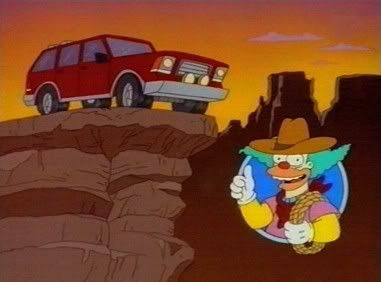D
Darkstar416
Guest
Ford heralds slow demise of the SUV
Large sports utility vehicles (SUVs) will go out of fashion because of environmental worries and demographic trends, a top Ford executive has said.
Mark Fields, who runs Ford's US business, said consumers would move away from SUVs to smaller cars in what he characterised as a "tectonic shift".
With an eye on future trends, Ford is considering spending $1bn (£523m) on plants to produce more hybrid vehicles.
The investment, yet to be finalised, would be in its home state of Michigan.
Ford is talking to the state's Economic Development Corporation about incentives that would allow it to build new facilities in Detroit, home of the US car industry.
Beset by falling sales in the US and rising costs, Ford is planning to cut 30,000 jobs - many of which will go in Michigan.
But Ford is looking at ways of retaining as many jobs there as possible.
In a speech to industry experts, Mr Fields said that accelerated investment in hybrid vehicles and energy-saving technology was a financial as well as an environmental necessity for Ford.
Its research had shown that 70% of Americans were now "very concerned" with the environment and that fuel efficiency was one of the three most important factors in influencing people's choice of cars.
"Consumers are speaking loud and clear," Mr Fields said.
"They are telling us that the social and environmental trade-offs associated with automobiles are increasingly unacceptable.
"They want cleaner, safer, more efficient vehicles that don't compromise on function or value."
Like US rival GM, Ford has been hurt by falling sales of SUVs over the past 18 months, as soaring gasoline prices have made the vehicles increasingly unaffordable for many users.
The drift away from large SUVs and towards smaller cars and crossover vehicles began in 2003, Mr Fields noted.
It will become more pronounced, he said, because of consumer pressure for environmental sustainability and changing population trends.
The buying patterns of middle-aged Americans - the "baby boomer" generation - were changing with more emphasis on smaller, more flexible products.
With younger Americans expected to buy fewer vehicles than their parents, Mr Fields said Ford would need to radically rethink the types of cars it should be putting on the road.
"The lesson we take from this tectonic shift is that listening to our customers has never been more important.
"The old saying, 'if you build it, they will buy it,' needs to be put to rest."
Mr Fields said there were positive signs that Ford was getting to grips with its problems, having arrested the decline in its US market share.
The firm plans to launch nine new vehicles in the next six months and will develop its new flagship Lincoln sedan by 2008.
Story from BBC NEWS:
http://news.bbc.co.uk/go/pr/fr/-/2/hi/business/4777303.stm
Published: 2006/08/09 16:57:47 GMT
© BBC MMVI
Large sports utility vehicles (SUVs) will go out of fashion because of environmental worries and demographic trends, a top Ford executive has said.
Mark Fields, who runs Ford's US business, said consumers would move away from SUVs to smaller cars in what he characterised as a "tectonic shift".
With an eye on future trends, Ford is considering spending $1bn (£523m) on plants to produce more hybrid vehicles.
The investment, yet to be finalised, would be in its home state of Michigan.
Ford is talking to the state's Economic Development Corporation about incentives that would allow it to build new facilities in Detroit, home of the US car industry.
Beset by falling sales in the US and rising costs, Ford is planning to cut 30,000 jobs - many of which will go in Michigan.
But Ford is looking at ways of retaining as many jobs there as possible.
In a speech to industry experts, Mr Fields said that accelerated investment in hybrid vehicles and energy-saving technology was a financial as well as an environmental necessity for Ford.
Its research had shown that 70% of Americans were now "very concerned" with the environment and that fuel efficiency was one of the three most important factors in influencing people's choice of cars.
"Consumers are speaking loud and clear," Mr Fields said.
"They are telling us that the social and environmental trade-offs associated with automobiles are increasingly unacceptable.
"They want cleaner, safer, more efficient vehicles that don't compromise on function or value."
Like US rival GM, Ford has been hurt by falling sales of SUVs over the past 18 months, as soaring gasoline prices have made the vehicles increasingly unaffordable for many users.
The drift away from large SUVs and towards smaller cars and crossover vehicles began in 2003, Mr Fields noted.
It will become more pronounced, he said, because of consumer pressure for environmental sustainability and changing population trends.
The buying patterns of middle-aged Americans - the "baby boomer" generation - were changing with more emphasis on smaller, more flexible products.
With younger Americans expected to buy fewer vehicles than their parents, Mr Fields said Ford would need to radically rethink the types of cars it should be putting on the road.
"The lesson we take from this tectonic shift is that listening to our customers has never been more important.
"The old saying, 'if you build it, they will buy it,' needs to be put to rest."
Mr Fields said there were positive signs that Ford was getting to grips with its problems, having arrested the decline in its US market share.
The firm plans to launch nine new vehicles in the next six months and will develop its new flagship Lincoln sedan by 2008.
Story from BBC NEWS:
http://news.bbc.co.uk/go/pr/fr/-/2/hi/business/4777303.stm
Published: 2006/08/09 16:57:47 GMT
© BBC MMVI





